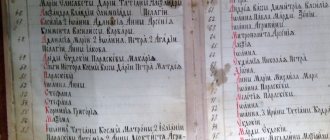Translation of the text from Arabic: “O Allah! Forgive, have mercy and deliver him (we are talking about deliverance from torment, temptation and the darkness of the grave), and show him mercy and a good welcome (that is, make his lot in Paradise good), and make the place of his entry spacious (meaning the grave), and wash him with water, snow and hail, and cleanse him from his sins, just as You cleanse white clothes from dirt, and give him in return a house better than his house, and a family better than his family, and a wife better than his wife, and bring him into Paradise, and protect it from the torment of the grave and from the torment of Fire." (Hadith Muslim bin al-Hajjaj. al-Sahih. Ar-Riyadh, 1421.2000 - 2232) One of the most common questions concerns the dua for a deceased Muslim, whether it is possible to read a dua to the Almighty for the deceased and which one, and also whether it is true that the prayer to the Almighty We cannot read to Allah for the dead non-Muslims?
Listen and download the dua (shown on the left in the photo):
In terms of significance, the dua that is read by the righteous children of a deceased Muslim has the same power as reading the Quran for the deceased, and not only if a person close to him or his child reads the dua or the Quran - any person who reads the dua for the deceased can with your prayers to seek forgiveness for him. The amount of the reward does not depend on whether dua is read at home for the deceased or pronounced in a mosque. The sunnah is to visit the graves of dead Muslims and read dua for them.
Dua for the deceased
All rights reserved َأَنْتَ غَنِـيٌّ عَنْ عَذابِـه، إِنْ كانَ مُحْـسِناً فَزِدْ في حَسَ Translation of the meaning:
O Allah, Your servant and the son of Your handmaid needed Your mercy, and You do not need torment him ! If he did good deeds, then add them to him, and if he did bad, then do not punish him!
Translit: Allahumma, 'abdu-kya wa-bnu ama-ti-kya ichtaja ila rahmati-kya, wa Anta ganiyun 'an 'azabi-hi! In kyana muhsiyan, fa zid fi hasanati-hi, wa in kyana mu-si'an, fa tajawaz 'an-hu!
Dua for the deceased
اللهُـمِّ اغْفِـرْ لَهُ وَارْحَمْـه ، وَعافِهِ وَاعْفُ عَنْـه ، وَ أَكْـرِمْ نُزُلَـه ، وَوَسِّـعْ مُدْخَـلَه ، وَاغْسِلْـهُ بِالْمـا All rights reserved. ّيْتَ الـثَّوْبُ الأَبْيَـضُ مِنَ الدَّنَـسْ ، وَأَبْـدِلْهُ داراً All rights reserved. ً خَـيْراً مِنْ زَوْجِه ، وَأَدْخِـلْهُ الْجَـنَّة ، وَأَعِـذْهُ مِنْ عَذابِ القَـبْر وَعَذابِ النّـار
Translation of the meaning: O Allah, forgive him, and have mercy on him, and deliver him (from the torment and temptations of the grave.), and show him mercy, and give him a good welcome (that is, make his lot in Paradise good), and make a grave his spacious, and wash him with water, snow and hail, and cleanse him from sins, as You cleanse white clothes from dirt, and give him in return a house better than his house, and a family better than his family, and a wife better than his wife, and bring him into paradise and protect it from the torment of the grave and from the torment of fire!
Translit: Allahumma-gfir la-hu (la-ha), va-rham-hu (ha), wa 'afi-hi (ha), wa-'fu 'an-hu (ha), wa akrim nuzulya-hu ( ha), wa wassi' mudhala-hu(ha), wa-gsil-hu(ha) bi-l-ma'i, wa-s-salji wa-l-baradi, wa nakky-hi(ha) min al-hataya kya-ma nakkayta- s-sauba-l-abyada min ad-danasi, wa ab-dil-hu(ha) daran hairan min dari-hi(ha), wa ahlyan hairan min akhlihi(ha), wa zaud -zhan khairan min zauji-hi(ha), wa adhyl-hu(ha)-l-jannata wa a'yz-hu(ha) min 'azabi-l-kabri wa 'azabi-n-nari! (Feminine endings are given in parentheses when praying for a deceased woman)
Source of the article: https://muslimclub.ru/islam/dua/za-umershego.html
Tatar prayer for a deceased mother
Tleu Aty Kuran. Salauaty iman. Aladim Rahim. Pagabayrdan shapagat bulsyn.Amen
Surah Al-Fatiha Aguzu billahi minash-shaitanir-rajim. Bismillahir-rahmanir-rahim. Alhamdu lillahi robbil-*alamin. Ar-rahmanir-rahim. Malikiyaumeddin. Iyaka nagbudu ua iyaka nastagin. Ihdinas-syrotal mustakim. Syrotal-lyazina angamta galaihim. Gairil magdubi galaihim wa lyaddaollin. Amen
Surah Alif.lam.mim Bismillahir-rahmanir-rahim. Alif.Lam.mi-i-im. Valikyal-kitabu la raybya fiih, hudal lilmutakinal lazina yu'minuna bilgaibi. Wa yukimunas salata wa mimma razaknahum yunfikun. Ual lyazina yuminuna bima unzila ilyayka. Ua ma unzila min kablik. Wa bil ahiryatihum yukiunun. Ulyayaika *ala hudam mir-rabbihim, Uya ulayaika humul muflihun. Wal hukmu shahun wahidul la ilaha, illya huarr rahmanur-rahim. Amil
Surah Ayatu-l-kursi Bismillahir-rahmanir-rahim. Allahu la illahi, illya hual khayyul-qayyum. La tahuzuhu sinat wa la naum. Lahu mafis Samauati ua mafil ard. Man zyal-lyazi yashfa gu indahu illya bi-iznih. Yalamu ma baynya aidihim. Wa ma halfahum. Wa la yuhituna bi shaim min ilmihi. Illa bima shaa wasia kursiyhus samauati. Wal ard. Wa la yauduhu hifzuhuma, wa huual alliyul gazim. Amen
Sura Ya-sin 1. Yasin, 2. walqur'anilhakimi 3. innakalaminal mursalina 4. g'ala siraddin mustakim. 5. Tanzilal ghazirrakhim. 6.Li tunzira kauman ma unzira abaukhum fakhum gafilun. 7.La qad haqqal qaulyu gaala aksarihim fakhum la yu'minun. 8. Inna jag'alnya fi ag'nakihim ag'alalyan fahiya ilal azq'ani fakhum mu'mahun. 9. Uajag'alna mimbaini aidihim saddan, uamin halfihim saddan, faagshainahum fakhum la yubsirun. 10. Wasaua un g'alaihim a anzartahum amlam tunzirkhum la yu'minun. Inna ma tunziru manitabagazikra uakhashchiyarrahmana bil gaib, 11. fabashirhu bimmagfiratin waajrin karim. Inna nakhnu nuhyi mauta uannaktubu ma qadda mu asarahum 12.ua kullya shayin, ahsaynahu fi imamin mubbin. Surah Al-Ihras Bismillahir-rahmanir-rahim. Kul huu Allahu ahad. Allahu samad. Lam iyalid. Wa lam yulyad. Wa lam iakullahu kufuan ahad. Allahu Akbar. Amen (read the surah 3 times)
Surah al-Falyak Bismillahir-rahmanir-rahim. Kul aguzu birrabil falyak. Min sharri ma halyak Ua min sharri gasikin izya uakab. Ua min sharrin naf-fasati fil gukad. Wa min sharri hassidin izya hasad. Amen
Surah an-Nas. Bismillahir-rahmanir-rahim. Kul aguzu birrabin us. Malikin us. Ilyakhin us. Min sharill wasuasil khan-nas. Allyazi wasuisu fi sudurin us. Min al jinnati one-us. Amen.
Next, read the following (this is as a result, so that the Almighty accepts your prayer) Sadaqa-Allahul gazyim. Subhana rabbiqa-rabbil Izzati amma ya-sifun. Wa salamun ala mursalin. Alhamdu lillahi robbil galyamin. Amen
After completing your prayers, ask the Almighty for forgiveness for the sins of your loved ones. Tell whom you dedicate these prayers to and list the names of the deceased. Then you can ask the Almighty for your desires. And at the end say Rabbana atina fidduniya hasanata. Wa fil akhirati hasanatan wa kinya gezabenar. Birakhmatika rahmanir rahim, alhamdu lillahi robbil galyamin
Source of the article: https://vk.com/topic-58111319_28887716
Prayers for deceased Muslims
121 messages
Tleu Aty Kuran. Salauaty iman. Aladim Rahim. Pagabayrdan shapagat bulsyn.Amen
Surah Al-Fatiha Aguzu billahi minash-shaitanir-rajim. Bismillahir-rahmanir-rahim. Alhamdu lillahi robbil-*alamin. Ar-rahmanir-rahim. Malikiyaumeddin. Iyaka nagbudu ua iyaka nastagin. Ihdinas-syrotal mustakim. Syrotal-lyazina angamta galaihim. Gairil magdubi galaihim wa lyaddaollin. Amen
Surah Alif.lam.mim Bismillahir-rahmanir-rahim. Alif.Lam.mi-i-im. Valikyal-kitabu la raybya fiih, hudal lilmutakinal lazina yu'minuna bilgaibi. Wa yukimunas salata wa mimma razaknahum yunfikun. Ual lyazina yuminuna bima unzila ilyayka. Ua ma unzila min kablik. Wa bil ahiryatihum yukiunun. Ulyayaika *ala hudam mir-rabbihim, Uya ulayaika humul muflihun. Wal hukmu shahun wahidul la ilaha, illya huarr rahmanur-rahim. Amil
Surah Ayatu-l-kursi Bismillahir-rahmanir-rahim. Allahu la illahi, illya hual khayyul-qayyum. La tahuzuhu sinat wa la naum. Lahu mafis Samauati ua mafil ard. Man zyal-lyazi yashfa gu indahu illya bi-iznih. Yalamu ma baynya aidihim. Wa ma halfahum. Wa la yuhituna bi shaim min ilmihi. Illa bima shaa wasia kursiyhus samauati. Wal ard. Wa la yauduhu hifzuhuma, wa huual alliyul gazim. Amen
Why is it important to read dua for the dead?
Deceased parents and relatives need the living to read dua for them. The earthly journey is over, the deceased goes to the afterlife with the burden of his sinful deeds. Through prayers from the Koran for the deceased, you can convey to Allah a request to forgive the deceased for his misdeeds and to grant rewards for good deeds.
Duas read by relatives contribute to the remission of sins of the deceased and ease his fate in the other world. The beginning of the journey is considered to be the placement of the body of the deceased in the grave. The soul is separated from the physical shell, but the dead person feels, sees, rejoices, and is sad. Supporting loved ones for the soul of the deceased through reading duas and surahs is a ray of light.
The Messenger of Allah Abu Dawud said that all the affairs of the deceased cease. The exceptions are continuous alms, knowledge gained by people that is useful for society, and the prayers of children for their parents.
What duas are usually read when visiting the deceased in a cemetery?
Dua is a prayer appeal to the Almighty. Like visiting a mosque, it is an inseparable part of the spiritual life of followers of Islam. Muslims perform prayers for various occasions, including to ease the fate of the soul in the other world. Coming to the cemetery, relatives of the deceased read Dua when visiting the graves.
In the Muslim faith, caring for the soul and its fate after bodily death is important. Relatives of the deceased make obligatory dua for the deceased while visiting the graves, asking Allah to rest the spirit, settle it in paradise, soften the fate, and forgive sins.
Eternal life begins from the grave. The soul leaves the body, but continues to see, feel, feel sad, rejoice, worry. Relatives can express their thoughts to the deceased while visiting his grave.
The souls of the departed need prayers. After death, all human affairs cease, with the exception of three, the reward for which is counted even after death: constant alms, knowledge from which the living benefit, and true believing descendants who offer prayers for their ancestors.
Appeal to the Almighty is possible with the words of the Prophet or with your prayer.
A person who offended his living parents, brought them torment, but diligently makes dua for them after death, and visits their graves, can be forgiven by the Almighty.
Prayers of the living for the departed:
- they will reach the dead and bring them joy;
- will ease the soul's share in the afterlife;
- will bring cleansing to the living.
Dua is important for faithful Muslims. It is not as uncompromising as prayer. Prayer when visiting graves can be performed in any language. During prayer, a person is humble, admits that he is powerless before the Almighty, accepts what he has sent - illness, health, sorrow, joy. The believer humbly asks for help and protection. Prayers can be read at any time.
The time of grief, farewell to the departed, and the hours of visiting the graves of the deceased are accompanied by an appeal to Allah.
Alahhumyagfir darrajyattakhu vil-maddiinnya uahkhlyuvhu fi akkybikhhi fil-gabbirinya uggfirylyanya wa lyakhhu ya rabyall allyamin. Uaffsi lyakhhu fi kabrihi ua nyauir lyakhhu fifih.
- The body is wrapped in a shroud, and the imam performs the funeral prayer.
- The deceased is placed in a torbut; Muslims use a coffin in rare cases.
- While the body is being carried to the grave, dua is made.
- It is necessary to read dua at the entrance to the cemetery for the buried.
- They turn to Allah for the deceased with a request to forgive sins, when the lyahd is closed and the grave is filled up.
- After the burial, the accompanying people leave the cemetery, the imam remains and reads the talkin over the grave.
- Prayers are made when visiting graves or the house of the deceased.
During the burial, when visiting the graves, an appropriate atmosphere is observed. The prayers are read in a quiet voice with reverence, not allowing worldly topics in conversations, not allowing the peace of the dead to be disturbed. Women are prohibited from attending the funeral, as they may not be able to contain their emotions when saying goodbye.
The burial process is permeated with the reading of dua.
Visiting the dead is sunnah. Previously, ziyarats to graves were prohibited due to strong pagan traditions. Subsequently, the envoy pointed out the desirability of visiting the cemetery. Wisdom is hidden in ziyarat. A person thinks about death and the soul, offers prayers for the departed. Near the graves, the strength of the faith of a true Muslim grows stronger.
Visiting graves is allowed at any time. In and around the cemetery it is worth greeting the dead as they were greeted during life. Then you need to offer dua to the Almighty for the departed.
Peace be with you who are in the world of believers. You have found what everyone was promised. And tomorrow our time will come. And if Allah decides so, we will be with you. Oh, Almighty, forgive the departed.
To Aisha’s question about what to say when entering the cemetery, the prophet ordered to greet those lying in their graves and offer dua to Allah for them.
Muslim duas in a cemetery are allowed to be made in your own words. Visiting the graves of deceased relatives and friends is accompanied by prayers and requests to Allah to make their afterlife pleasant.
At the funeral
After the burial, those present make a prayer for the Almighty to forgive the sins of the deceased.
It is forbidden to recite verses from the Koran during a funeral. The Messenger of Allah did not recite surahs at the burial site, and followers read dua at funerals and when visiting graves.
Do you need the help of magical powers? Get an answer to your burning question from a magician and healer. Write about the problem right now, and an expert will suggest a solution online!
The text of the dua at a funeral is arbitrary; gratitude is given to Allah, a request to take care of the soul of the deceased.
In the Muslim religion, funerals are not allowed. After the funeral, they pray for the deceased, visit holy places, give alms, perform Hajj, and read dua. Funeral dinners are an innovation that true Muslims do not welcome.
They pray to Allah to grant the deceased a home and family in heaven, they ask him to forgive his sins and save his soul from suffering.
When visiting graves
A person performing ziyarat on a grave should behave as if he had come to visit a living person. During the visit, the living one makes a dua and asks for mercy for those lying in the ground. It is necessary to read the Koran a lot, to show hell to the buried.
When visiting graves, the Muslim prayer for the dead is read in your own words. Conditions:
- words are spoken sincerely, with pure thoughts;
- a Muslim prays diligently and humbly;
- the words of dua are offered at the grave without worldly thoughts, thinking about akhirat;
- We sincerely wish the buried the blessings of the Almighty.
Condolences to the relatives of the deceased are sunnah. The Messenger of Allah expressed his condolences. The Prophet expressed sympathy for the companion who lost his child.
A visit to a relative’s house in difficult times will strengthen and calm a person. He will bear the loss more easily and accept the will of the Almighty.
A Muslim is obliged to remind the relatives of the deceased about patience and acceptance of grief. There is no need to be annoyed with fate or complain about the will of Allah.
To Allah belongs what he took to himself, what he gave you. The Almighty has determined a deadline for everything. Show humility and thank Allah in the hope of reward.
The person receiving condolences must ask Allah to reward the person who visited his home.
Allah hears all appeals and requests. He knows the intentions of those who recite the dua, regardless of the language of prayer. The Almighty knows the words and thoughts of the one asking. The main thing is sincerity, worship of Allah, humility, faith. Etiquette for visiting the dead:
- At the entrance to the cemetery, those who are buried there are greeted.
- You are not allowed to walk between the graves during the visit. Muslims bury their dead in a niche in the side wall of the burial pit. The deceased lie to the side of the hill.
- The deceased are treated with respect. Texts from the Koran are read to them, then they pray.
- Dua can be read in any language. Memorized texts and duas pronounced in your own words are acceptable when visiting graves.
In Kumyk language
Assalamu 'ala ahhli-d-diyarri minna-l-mu'mininna val-muslimina, wa yarhamu-Llahhu-l-mustakdiminna minna val-mustahirina, wa in-na in shaa-Lahu bikum lahykunn.
Peace to the believers and Muslims lying here, may Allah have mercy on those of you and us who left earlier and those who stayed behind, but we, if Allah Almighty wants, will join you.
In Avar language
Bolon duniyal bolyon duniyal lying gyanib to the Muslims who believed, Allah will have mercy, Gieldasa kvatIire nuzher va nizher, begavulas mugal baraldasa, gieldasa, lingered below, the Almighty wills, Allah, let us join the askIov more necessary.
Bolyon duniyal bolyon duniyal is more necessary, those staying below the monastery of those who believed below, the Almighty wills, Allah, let us join the necessary below.
Muslim tradition involves frequent reading of prayers. Duas are appeals to the Almighty and such appeals can take any form, unlike prayer. Communication with the Lord accompanies all areas of a believer’s life, including visiting the graves of the dead.
On holidays, after performing Eid prayer, believers practice visiting the graves of their relatives, offering dua for them. In this regard, it is necessary to remember some rules of behavior in the cemetery.
In the early years of prophecy, Muhammad (s.a.w.) forbade Muslims from visiting the burial places of the dead. This was due to the fact that pagan rituals were popular among those around. Therefore, the Messenger of Allah (s.a.w.)
) waited for the moment when believers learn the basics of religion and thereby reduce the likelihood of people returning to the traditions of jahiliyya. After some time, the ban on visiting the graves was lifted.
One of the hadiths says: “Previously, I did not allow you to visit the cemetery, but from now on I do not object to this” (Muslim, Abu Dawud).
1) Think about another world, i.e. It is advisable for a believer to reflect on the fact that death will befall everyone. After all, none of us knows how much longer we are destined to live. On Judgment Day, the souls of people will have to bear responsibility for all their earthly deeds.
Therefore, during his life, a person should do as many good deeds as possible and as few bad deeds as possible, thereby bringing himself closer to the Gardens of Eden and moving away from the Hellfire. Visits to the cemetery help a Muslim analyze his earthly life. Messenger of Allah (s.a.w.)
Texts in Arabic and how to read dua for a deceased Muslim
All offered duas for the dead are best done at the moment of greatest likelihood of being heard by Allah. Favorable days for prayer are Friday, Eid al-Fitr, sunrise and sunset of each day. The Prophet Muhammad said them when performing janaza prayer (funeral prayer); it is permissible to perform a prayer service for a deceased loved one at any appropriate time.
The dua at a Muslim funeral should be read in the same way as the prayer of the Prophet, because his words of the Sunnah contain the correct sayings according to the will of Allah, they are the most accurate and true.
Before death
For a dying person, before death, it is necessary to read dua in Arabic to ease the path to eternal life. Text of the prayer:
“AllahummaGfir LaKhu (LaHa), VaRham-Khu (Ha), WaAfiKhi (Ha), WaFu 'AnKhu (Ha), WaAkrim NuzulyaKhu (Ha), WaVassi' MudhalaKhu (Ha), WaGsil-Khu (Ha) BilMa'i, VaS -salji ValBaradi, VaNak-KyKhi (Ha) MinAl-KhatayaKya-MaNakkaytaS-SaubalAbyada MinAdDanasi, WaAbDilKhu (Ha) DaranKhairan MindariKhi (Ha), VaAkhlyanKhairan MinAkhliKhi (Ha), VaZaud-ZhanKhairan MinZaujiKhi (Ha ), VaAdkhylKhu (Ha) LJannata WaA' YizKhu (Ha) MinAzabilKabri VaAzabiN-nari.”
In the text of the dua prayer, requests are made to Allah to forgive, have mercy, and deliver a dying man (woman) from the torment. By the grace of the Almighty, the prayer calls for a blessing on a spacious grave washed by waters, forgiveness of all sins, and in paradise to give shelter, a family, and the best wives. The translation tells of a request to protect the deceased from the torment of being in a cemetery and being burned by fire.
To get rid of the suffering of a dying person and grant a painless death, the following dua is pronounced:
“Allahumma, 'AbduKya VaBnu AmaTiKya IkhtajyaIlyaRahmatiKya, VaAnta GaniyunAn 'AzabiKhi! InKyanaMuhsiyan, FaZidFi HasanatiKhi, VaInKyana MuSi'an, FaTajawaz 'AnHu'.
For condolences
It is customary to express condolences to the relatives of the deceased in the first days of death before burial, when grief and visiting misfortune are a morally difficult test for loved ones. The Prophet Muhammad said that those who express sympathy are given a reward. The hadith says that if condolences are brought from relatives by blood or religion through dua, then the Almighty on the Day of Judgment will cover him with clothes that personify the generosity of a person.
When expressing words of support to the loved ones of the deceased, you should recite the text of the dua for condolences in Arabic:
"InnaaLilLyayahi VaInnaa IlayhiRaaji'uun."
The Holy Scriptures of the Koran say that human life will certainly be subject to trials that bring tears, which will help to reveal the moral level of the soul and the awareness of the acts committed. The prophet says that the Lord protects the steadfast and unshakable. In case of trouble, you should say the words of the dua:
“We are at the mercy of God. We will return to him."
Deceased parents up to 40 days
The commemoration of the deceased on the 40th day after the funeral takes place in the form of a meal in 2 rooms - separately for men and women. It is not customary to talk and show tears, but silently saying a prayer is respected, provided that the prayer has been performed the day before.
Muslim duas for deceased parents up to 40 days can be heard in 3 versions:
“LaIlahaIllallahul—AzymulHalima, LaIlaha Illallahu, Rabbul-Arshil—Azymi, LaIlahaIllallahu, RabbuSsamavati, VaRabbuLArdiWa RabbuL-Arshi-LKarimi.”
"Allahumma, RakhmatakyaArju, FaLaTakilni IlyaNafsi TarfataAinin VaAslih LiSha'niKullyahu, LaIlyaha IllyAnta."
"AllahuAllahu, RabbiLa UshrikuBhiShay'an."
For your peace
Dua is pronounced when the deceased's eyelids are closed. The prayer asks the Almighty to forgive, to elevate the soul of the deceased on the right path, to direct him to heaven, and to make the grave spacious:
Deeds that bring reward after death
Not only will dua for the deceased benefit the deceased himself, but other actions can benefit him. The greatest benefit comes to the deceased from what he did during his lifetime - his deeds, the result of which continues to bear fruit (sadaqa al jariya). As Anas ibn Malik said, the Messenger of the Almighty ﷺ said that three people will follow the deceased to the cemetery - his family members, the property he owned, as well as his deeds that he committed during his lifetime. Only two people will return from the cemetery after the funeral: his family members and his property, and the deeds that he did will remain with him. This incident is reported in a hadith narrated by Muslim and Bukhari. Those good deeds that a righteous child of a deceased parent performs will bring sawab to the deceased, and the reward of the child himself will not decrease from this, because a child is what the parents acquired. As the Prophet of Muhammad ﷺ said in an authentic hadith narrated by Abu Dawud, of all that a person used, the best is whatever he earned, and a child also refers to what he acquired.
“O Allah! Verily, (such and such, the son of such and such) is under Your protection and patronage, save him from the test of the grave and the torment of Fire, for You are faithful to the promise and truthful. Forgive and have mercy on him, for You are the Forgiving, the Merciful.” Hadith of Ibn Majah.
Another good that the deceased will do, and to whom this good will benefit no less than if a dua is read for him, is the knowledge and skills that he taught during his life, and everything that he gave to people and what they will be to use after his death. The Prophet Muhammad ﷺ also spoke about this, that after a person dies and all his deeds cease, only the action of his alms, his knowledge that he passed on to people and they can use, and his righteous children who will begin to pray to the Almighty do not cease Allah for him and make dua for the deceased.
Download and listen to the dua given on the left in the photo:
Before his death, a Muslim can bequeath his inheritance to spend on good deeds, and then after death the Muslim will receive a reward. Such things can be the construction of a mosque, roads and bridges, wells and water pipelines - everything that people need. The hadith transmitted by Abu Huraira lists those deeds that benefit the deceased after death, in this series: the righteous son whom the deceased left behind on earth and who reads dua for him, this is the Koran, which he passed on as an inheritance to his descendants, this is the house or mosque that he left to people after his death, this is the river that the deceased led, this also includes wells, springs that will benefit people, and this is also the alms that the deceased gave when he was healthy and full of strength.
Not only can a person read dua and ask for a deceased Muslim, but he can also perform actions for his benefit. If a deceased Muslim made a vow before his death, promising to donate some wealth, then if after his death his son brings such a sacrifice or performs the Hajj that his father promised to perform, this will also benefit the deceased.
Is it possible to use dua to help a deceased person?
There are both supporters of the idea that dua can help the deceased and opponents. As an example in favor of the need to say prayers, a verse of the Koran is given, which speaks of the compassion and mercy of the Lord towards people who are initiated into the faith before those who pray. The verse confirms that one can ask for forgiveness for ancestors who have left the world; the effectiveness of prayer has been proven.
Among the opponents of the theory about the possibility of influencing the path of the soul of the deceased with the help of prayers, the following arguments are presented:
- a Muslim should not hope to receive his own benefits at the expense of a dua from another believer;
- the deceased receive only those rewards that they themselves achieved;
- according to the interpretation of the suras of the Koran, on the Day of Judgment, descendants will put righteous deeds on the scales of their ancestors.
Every person has the right to count on a dua and a good word from the lips of his children after death, but it is more important to go through the path of life without succumbing to temptations and the fall. Love for God and harmonious coexistence with people will open the way to heaven.
Suicides and Janaza
As for suicides, it is known that the Prophet Muhammad (peace and blessings of Allah be upon him) did not perform the funeral prayer over a suicide, thereby showing extreme dissatisfaction with the act committed and sharply condemning it, but at the same time did not prohibit others from performing Janazah prayer[28 ]. Both Hanafi and Shafi'i theologians believe that it is canonically permissible to wash a suicide and perform a funeral prayer over him, since he is not a criminal against others[29]. His destructive crime is limited to himself, who abandoned the most significant blessing of God - life, and the Creator Himself is the judge over him. Al-Khattabi writes in the book “Ma'alim al-Sunan”: “There is some disagreement between scholars on the issue of performing the funeral prayer over a suicide. 'Umar ibn 'Abdul'Aziz, as well as al-Awza'i, did not consider this necessary. However, the majority of theological scholars spoke out in favor of performing a funeral prayer over a suicide.”[30] Ash-Shurunbulali[31] stipulates: “Imam Abu Hanifa and Imam Muhammad believed that a suicide is washed and a funeral prayer is performed over him, and this is more correct”[32]. Imam Ibn al-'Arabi said: “Scholars believe that the funeral prayer is performed over every Muslim, regardless of whether he was executed for a crime, whether he committed suicide or was illegitimate.”[33] Imam Malik believed: “Truly, the imam (leader, head of the community) does not perform the funeral prayer over an executed criminal. Respected people do not pray for vicious people, to censure the actions they have committed and as an edification to others. Relatives or friends can perform the funeral prayer if they wish.”[34] Imam al-Shafi'i said: “The funeral prayer is not left imperfect for anyone, be it a righteous person or a sinner.”[35] So, the Messenger of the Lord (may the Almighty bless him and greet him) sometimes refused to personally perform the funeral prayer, as was the case with the thief, suicide, debtor and adulteress. But his refusal was not a prohibition for others, since the Prophet’s companions performed the funeral prayer, and he, seeing this, did not forbid them, and sometimes even himself ordered it to be carried out (without him) [36]. It was the absence of a prohibition, as well as the order to the companions to perform the funeral prayer, that was the reason that most scholars spoke about the need to carry out all burial procedures for suicides and criminals. After all, people are judged by external signs, but the essence of crimes, and perhaps mistakes, is known only by the Lord, Who will judge with true knowledge of the matter and according to His justice on the Day of Judgment.
Prayer for the repose of the soul of the deceased in Orthodoxy
When a loved one passes away, it is an irreparable grief. But the loss of a loved one must be overcome, no matter how difficult it may be, and move on. It is believed that the worst thing is when parents have to bury their children. But it can hardly be said that it is less difficult for children to say goodbye to their beloved parents forever. The mental pain from the loss of other relatives can also be unbearable.
When they say that time heals, this is a false statement. The pain of losing a loved one remains in a person’s soul for the rest of his life. But it dulls not because time passes, but because the emptiness in the soul gradually begins to be filled with various everyday worries. But at the same time, a loved one will always be missed, and from time to time each of us tries to mentally communicate with our loved ones.
How to pray for the newly deceased, so that the soul goes to heaven
Of course, when a loved one passes away, you don’t want to accept this fact. But we should remember that our emotions, feelings and suffering do not allow the deceased to calmly pass into another world. We do not let go of his soul from us and this greatly harms him. This is due to the fact that the soul of the deceased rushes about and cannot find its place. In the first days after a person’s death, she simply hovers in space. Therefore, the task of the relatives is to release the soul of the deceased from themselves and help it take its place in Heaven.
- Immediately after death, order liturgies and memorial services in the church within 40 days.
- Be sure to arrange a wake on the 9th and 40th days. This is due to the fact that on these days the soul of the deceased appears before the Lord. The more living people remember about the deceased these days, the better.
- Every day at home for 40 days you need to pray at home for the repose of the soul of the deceased. Whether your loved one goes to heaven depends on this.
Remember that it is very important to pray for the repose of the newly deceased within 40 days after his death. But we must also remember to offer prayers for the repose later. There are special days for this. This will not only help the soul of the deceased find peace, but will also allow you to calm down from an irreparable loss and cope with grief.
An effective prayer goes like this:
How to order a magpie and a memorial service for the deceased in church
Losing a loved one is a very difficult event. But you need to understand that nothing can be changed. In difficult moments of life, you need to remember that with some of your actions you can help the soul of the deceased quickly find peace in Heaven. For this purpose, first of all, on the main dates associated with departure to another world, a church memorial service is ordered. And for the believer it is of great importance, as it allows one to survive grief. A memorial service is a service held on the third, ninth and fortieth days after a person’s death.
- Visit the temple in advance.
- Leave the offering on the funeral table.
- Write a note with the name of the person you want to remember and give to the priest.
- Tell the priest on what day you would like to order a memorial service.
It is believed that on the ninth day the soul of a deceased person will appear before the Lord and await the arrival of the nine angelic ranks. On this day, the purpose of the memorial service in the church is to ask the Almighty to help the soul of the deceased get closer to the holy angels. During the funeral service, all believers in the temple must hold lit candles in their hands. In this way, sincere love for the deceased is expressed, which is necessarily read out by the Lord at the Fair Judgment. A memorial service for 9 days can be held in different churches.
On the fortieth day, the soul of a deceased person, after walking through hell, ascends to God for the third time. At this moment her fate will be decided. This decision largely depends on the earthly deeds of the deceased person, but prayers for the repose of the soul, which were offered by relatives throughout the entire time after death, also play an important role.
A memorial service can also be ordered for the anniversary of death. But this memorial event is not obligatory.
Very often, to calm their own souls, people order magpie for the deceased. This ritual is a special type of remembrance. For repose, the magpie is ordered for 40 days, six months and a year. For 40 days, a prayer is read in church for the repose of the deceased, and it is during this period that the deceased’s sins are absolved.
Who should I light a candle for the repose of my father and mother?
Candles for the repose are placed on a special eve table. This design is usually installed to the left of the entrance. The table is covered with a metal or marble board. It is easy to recognize, since there is a rectangular candlestick on it, on which the Crucifixion of the Lord is installed. If for some reason there is no such table in the church, then you can put a candle for the repose of your father or mother near any icon. But it is very important not to do it thoughtlessly. It is necessary to remember the deceased and stand in silence for a while near a lit candle.
When you light a candle for repose, you must follow the following rules:
- Cross himself twice at the Crucifixion of the Savior.
- Light a candle from other burning candles or from a lamp.
- Place the lit candle in a free cell and secure it so that it does not tilt or come into contact with other candles.
- After installing the candle, you need to whisper the following words: “Rest, O Lord, the soul of your departed Servant (name).”
- Cross yourself and bow.
Funeral prayer (janaza prayer)
Performing prayer for the deceased, as we mentioned above, is farz al-kifayat and includes arcana, conditions and desirable actions.
There are seven arcana for the deceased prayer:
1. Intention, as in other prayers.
The time of entry into Janaza prayer, as in other prayers, is the time of the introductory takbir. In the intention, it is enough to mention only farz and it is not necessary to indicate farzul-kifaya (collective duty). It is also not necessary to identify the deceased as Zayd or Amr, a woman or a man, that is, the intention to perform prayer for this deceased is sufficient. If someone follows the imam, it is enough for him to intend to perform namaz for the one for whom the imam made the intention. If the person performing the Janaza prayer identified and made a mistake about who the prayer is being performed for, for example, he made an intention for Amr, but it seemed to be Zayd, or he made the intention to perform a prayer for a man, but it turned out that it was a woman, then such a prayer is not counted . And if at the same time he pointed to it, for example, made the intention to perform namaz after this Amr, then it is counted. If several dead people are present, one should intend to perform janaza prayer for all of them. And the one who follows the imam must intend, as in other collective prayers, to follow him.
2. Pronunciation of the four takbirs.
From Ibn Abbas (may Allah be pleased with him) it is reported that “The Messenger of Allah (peace and blessings be upon him) performed Janazah prayer near the grave after the funeral and read four takbirs.” Even if you deliberately add the fifth takbir, the prayer is not broken. A hadith narrated from Ibn Arqam (may Allah be pleased with him) states that “The Messenger of Allah (peace and blessings of Allah be upon him) said takbir five times.” And if you say the fifth takbir out of forgetfulness, the prayer is definitely not broken, and in any case, juju-sahvi is not performed. If the imam reads the fifth takbir, given that the prayer is not violated, it is not advisable for the mamumu to follow him. He will give salam or wait for the imam to complete the prayer with him, the latter is the best option for him in this case.
3. Salam, that is, exit from prayer . This salam is similar to the salam of other prayers in form and quantity.
4. Reading Surah al-Fatiha . As in other prayers, after the first takbir, Surah al-Fatiha is read. It is also permissible to read al-Fatihui after the remaining takbirs, if it was not read after the first. And if he reads al-Fatihah after the second takbir, then it is advisable to maintain order in it, that is, first read al-Fatihah and only then salawat (blessings on the Prophet and blessings upon him).
5. Reading the salavataz of the Prophet (peace and blessings be upon him) only after the second takbir . In a hadith narrated from Aisha (may Allah be pleased with her), the Prophet (peace and blessings be upon him) said: “ The Almighty does not accept prayer without ritual purification and blessing on me .” Reading salawatza the family of the Prophet (peace and blessings be upon him) is not necessary, but it is advisable.
6. Dua after the third takbir, in which the reader specifies the deceased, and it is not enough to make this dua after another takbir . And if the deceased is alone, then it is not enough to make dua in the plural. The minimum of the dua is
لَهُ وَ ارْحَمْهُ
"Allahummag`firlahuvarhamhu"
Translation: “Oh Allah forgive him and have mercy on him.”
7. Performing prayer while standing . This condition is obligatory on one who is able to stand, as in other (obligatory) prayers.
Desirable actions in Janazah prayer.
1. Raising your hands to shoulder level when reading takbirs.
2. Reading Surah al-Fatiha to yourself.
3. Reading taavwuz, but reading dua al-iftitah (prayer of initiation) and surah is not advisable.
4. Saying Amin after Surah al-Fatiha.
5. Reading the following dua after the third takbir:
اللَّهُمَّ هَذَا عَبْدُك وَابْنُ عَبْدَيْك خَرَجَ مِنْ رَوْحِ الد ُّنْيَا وَسَعَتِهَا إلَى ظُلْمَةِ الْقَبْرِ وَمَا هُوَ لَاقِيهِ كَاِ نَ يَشْهَدُ أَنْ لَا إلَهَ إلَّا أَنْتَ وَأَنَّ مُحَمَّدًا عَبْدُك وَرَسُولُك ، وَأَنْتَ أَعْلَمُ بِهِ ، اللَّهُمَّ إنَّهُ نَزَلَ وِك َأَنْتَ خَيْرُ مَنْزُولٍ بِهِ ، وَأَصْبَحَ فَقِيرًا إلَى رَحْمَتِك وَأَنْتَ غَنِيٌّ عَنْ عَذَابِهِ ، وَقَدْ جِئْنَاك رَاغِبِينَ إلَيْك شُفَعَاءَ لَهُ ، اللَّهُمَّ إنْ كَانَ مُحْسِنًا فَزِدْ فِي إحْسَانِهِ ، وَإِنْ كَانَ مُسِيئًا فَاغْ All rights reserved. فِتْنَةَ الْقَبْرِ وَعَذَابَهُ ، وَأَفْسِحْ لَهُ فِي قَبْرِهِ ، وَ All rights reserved. ِنْ عَذَابِك حَتَّى تَبْعَثَهُ آمِنًا إلَى جَنَّتِك يَا أَرْحَمَ الرَّاحِمِينَ
“Allahumma haza 'abdukawaibnu 'abdayka, harazha min rawhidunyawasa'atiha or zulmatil-kabrivamahuvalakihi, kanayashhadu an la ilakhailla Anta wa anna Muhammadan 'abdukavarasuluka, wa Anta a'lamubihi, allahummainnahuanzalabikawa Anta khayrumanzulinbihi, waas bahafakiran ila rahmatikava Anta ganiyun 'an 'azabihi, wa kad jinaka ragibina ilayka shufa'aalahu. Allahumma in kanamuhsinanfazid fi ihsanihi, wa in kanna musian fagfirlahu vatajavaz 'ankhu valakkihi birahmatika rizaka wakihi fitnatal-kabri wa 'azabihi wa afsihlahu fi kabrihiwazafil-arza 'an janbaikhi wa lakkihi birahmatika l-amna min 'azabika hata tab'asahu aminan ila zhannatika i Arhama rrahimin"
Translation: “O Allah, it is Your servant, the son of Your two slaves, who left his loved ones and the vastness of this world, as well as the close people in it, and moved into the darkness of the grave and to what awaits him in the grave, he testified that no deities other than You and that Muhammad (peace and blessings be upon him) is Your servant and messenger, and You are more knowledgeable about this.
O Allah, he stayed with You, You are the best to stay with, and he became in need of Your mercy, and You do not need to subject him to punishment. We turn to You, trusting in You as intercessors for him. O Allah, if he was virtuous, increase his good deeds, and if he was a bad person, forgive him, endow him with Your mercy and contentment and protect him from the torments and horrors of the grave, expand his grave, endow him, by Your mercy, with security from his punishment until you bring him safely into Paradise. O Most Merciful of the Merciful."
For women, the prayer is read in the feminine gender: all pronouns and verbs in the masculine gender are replaced by the feminine gender.
Before this prayer, it is also advisable to read the following prayer:
وَشَاهِدِنَا وَغَائِب ِنَا وَصَغِيرِنَا وَكَبِيرِنَا وَذَكَرِنَا وَأُنْثَانَا ، اللَّهُ مَّ مَنْ أَحْيَيْته مِنَّا فَأَحْيِهِ عَلَى الْإِسْلَامِ وَمَنْ تَوْ َفَّيْته مِنَّا فَتَوَفَّهُ عَلَى الْإِيمَانِ
“Allahumma gfir likhayina wa mayitina wa shagyidina wa gaibin wa sagirina wa kabirina wa zakarina wa unsana. Allahumma man ahyaytahu minna faahyihi 'alal islami wa man tawaffaitahu minna fatawaffahu 'alal imani.'
Translation: “Oh my Allah, You forgive the sins of our dead and living, present and absent, young and old, men and women. O my Allah, whomever You revive among us, revive them in Islam (with faith), and whomever You kill, make them die in Iman.”
If the deceased is a child, then after this prayer they read:
وَسَلَفًا وَذُخْرًا وَ All rights reserved. بَعْدَهُ وَلَا تَحْرِمْهُمَا أَجْرَهُ
"Allahummaj'alhu faratan liabawayhi (ha), wa salafan, wa zukhran, wa 'izzatan wa'ibaratan wa shafi'an wa sakkil bihi mawazinahuma wafrigi ssabra 'ala kulubihima wa la taftinhuma ba'dahu wa la tahrimhuma ajrahu."
Translation : “Oh my Allah, make this child gone to prepare a place in Paradise for his parents, a precious treasure and the best sermon, a reason for insight and an intercessor, make the right side of their scales heavier, pour patience into their hearts, do not lead them into confusion after it and do not deprive them of their reward for this prayer.”
If the mammum lags one takbir behind the imam for no reason (that is, does not have time to recite the takbir until the imam has pronounced the next takbir), then in this case his prayer is violated, since a lag of one takbir is here considered an excessive lag, similar to a lag of one rak'ah in other prayers.
The Masbuk (latecomer) recites al-Fatihah immediately after the opening takbir, observing the order of his prayer and not paying attention to what the imam is reciting.
If the imam pronounces the next takbir immediately after the takbir of the masbuk before the masbuk begins the reading of al-Fatiha, then he (the masbuk) will read the takbir after the imam and the reading of al-Fatiha disappears from him. This case is similar to when the imam in other prayers bows from the waist immediately after the masbuq enters the prayer.
If the imam reads the next takbir, and the mamum reads Surah al-Fatiha, then the latter leaves the reading of al-Fatiha and follows the imam.
If the masbuk, having started reading the auz or opening prayer, lags behind the imam, then he reads from al-Fatiha a proportionate amount of text with what he has already read from the desired one; if he reads the auz or opening prayer to his wife, then he immediately follows the imam. And when the imam gives salam, he will complete the rest of the takbirs along with their prayers.
It is advisable not to raise the deceased from the place of prayer until the latecomer has completed his prayer.
Conditions of janaza-namaz (funeral prayer)
In janaza prayer, it is obligatory to observe the same conditions as in other obligatory prayers. Another important condition is to wash the deceased before Janazah prayer. Performing janaza-namaz collectively is not a mandatory condition (jamaat), but it is an urgent sunnah. The obligation to perform janaza-namaz from the entire jamaat of a particular locality is removed if the janaza-namaz was performed by at least one person. This obligation is removed even if janaza prayer is performed by a minor. However, the obligation is not removed due to the performance of janaza prayer by women if men are present. And if there are no men at all, women perform namaz out of necessity, but not collectively; and this obligation is removed.
Residents of a particular locality perform janaza prayer (from a distance) for the deceased who is located outside the locality, regardless of whether he is in the direction of Qibla or not, at a distance from the shortening of prayers or not. As for the one who died in this locality, those who are in it do not have the right to perform janaza prayer on it from a distance. If janaza prayer is performed at a distance, then the performers must be from among those who were obliged to perform it at the time of the death of the deceased.
Janaza prayer is not performed at the grave of the Prophet Muhammad (peace and blessings be upon him) and at the graves of other prophets, since we were not the people at their death who were entrusted with the responsibility of performing Janaza prayer for them.
The Hadith of the Prophet (peace and blessings be upon him) says:
«The Almighty cursed the Jews and Christians who took the graves of their prophets as places of worship».
When janaza prayer is performed by those present at the site, the distance between the deceased and the person performing the prayer should not exceed about 144 meters. It is obligatory to perform prayer on him before he is buried, but if he is buried without performing prayer, then those who did this fall into sin, and janaza prayer, in this case, must be performed at the grave, it is not necessary to dig up the deceased from graves.
Also, a condition for janaza prayer is that the person performing this prayer does not stand in front of the body of the deceased towards the qibla.
Who prefers to be an imam in Janaza prayer?
It is preferable for a relative of the deceased to be the leader of the prayer than for a ruler, because his prayer is closer to acceptance.
The relatives who are preferred to lead the prayer include the father, then the grandfather, great-grandfather, then the son, grandson, great-grandson, then brother, etc. This order is observed because parents have more compassion than children, and children more than brothers, and the prayer of the more compassionate is most likely to be accepted.
A sibling is preferred over a half-brother on the father's side because the former is more compassionate because he is closer. Then, if the deceased does not have the above-mentioned relatives, then the janaza prayer is led by his own nephew, then by the son of his half-brother, then by the rest of the relatives on his father’s side in order of inheritance. And of these, the first is the uncle, then the step-uncle, then the cousin.
If the deceased was a slave, after the father's relatives comes his former master, and after him his relatives. Then come the maternal relatives, of which the mother's father comes first, then the mother's brother, then the mother's brother, then the mother's father's brother.
If two relatives of equal degree are present, then preference is given to the one who is more conscientious. The one who has been in Islam longer is preferred to the one who is more knowledgeable in matters of Janaza-salaah, while in other prayers preference is given to the one who is more knowledgeable in matters of salaat.
One of the main goals of janaza prayer is to pray for the deceased, and the one who has been in Islam longer is more compassionate towards the deceased, and his prayer is closer to acceptance. If he is a wicked person, then he is definitely not given preference.
If those gathered are equal in degree of relationship, and they agreed to nominate one of them to lead the prayer, then this chosen one will become the imam. And if they do not agree, then they cast lots to end the dispute.
To perform janaza-namaz, the deceased is laid down depending on his gender. If it was a man, then he is laid on his left side, and if a woman, on the right. But laying the deceased, regardless of his gender, on the back of his head, in such a way that his head is to the west and his legs to the east, then such a laying was not conveyed in the sunnah. But, however, when it is not possible to carry out the above-mentioned arrangement, then there are no problems with this method, and in any case the prayer is counted.
The person performing janaza prayer, whether he is an imam or an individual performer (not a jamaat), stands at the head of the deceased or at the waist if the deceased is a woman.
It is allowed to perform janaza prayer for several deceased people. But it is preferable to read a separate prayer for each, if possible.
If they perform janaza prayer for several people who were brought at the same time, then the man is placed closest to the imam, then the boy, then the hunsa, then the woman. If they are all men or women, then the one who fears God is brought closer. And if they are brought one after another, then the one who was brought first among men or women is placed in front of the imam, even if the next one turns out to be preferable. However, if a woman was brought first, and then a man or an underage boy, then she is laid down after them. If a minor is brought in front of a man, then the man is not laid down first.
The consent of relatives is necessary to perform one prayer for everyone, and if everyone agrees, then the relative of the deceased who was brought to the place of prayer first is considered the most worthy to lead this prayer, regardless of whether the deceased is a man or a woman. And if all the dead were brought at the same time, then they cast lots among the relatives, and so they determine the leader of the prayer, and if they do not agree, nominate one of them.
It is forbidden to perform janaza prayer for an infidel, regardless of whether he is hostile (harbiy) or an infidel under the protection of Muslims (zimiy). It is not obligatory to wash the deceased infidel, but it is permitted, for the companion Ali (may Allah be pleased with him) washed his father. In terms of the permissibility of washing an infidel, his relative and a stranger are equal, but an unfaithful relative is more suitable for this and performing other necessary actions.
It is obligatory to wrap an infidel who is under the protection of Muslims (zimi) in a shroud. But it is not necessary to wrap an infidel in a shroud, or bury him if he is an enemy (harbiy).
If an organ of a Muslim whose death is certain is found, janaza prayer is performed on it after it has been washed and covered with a piece of cloth with the intention of performing prayer for the whole person.
If the death of the one to whom this organ belongs is unreliable, then namaz is not performed, but buried.
If a miscarriage makes some sound, screams or cries, and then dies, then the decision in relation to him is the same as for an ordinary deceased. That is, for miscarriages, prayer is performed after confirming the presence of life and subsequent death; the miscarriage should be washed and wrapped in a shroud.
If the miscarriage does not make a sound or cry, but at the same time shows signs of life (trembling or moving), then janaza prayer is also performed on it and washed. And if signs of life have not appeared, then they do not perform janaza-namaz and do not wash it, because the presence of life in it has not been confirmed.
The decision regarding wrapping a miscarriage in a shroud is similar to the decision about bathing. If the miscarriage occurs after four months or more, then it is washed and wrapped in a shroud, otherwise not.
Based on materials from the books: Kanzurraghibin and Mughni al-mukhtaj
Prepared by: Akhmad Magomedov
Funeral prayer for the repose
A memorial prayer for the repose is special words aimed at calming the soul of the deceased. By praying for repose, we not only invisibly help the deceased, but we ourselves are consoled in our grief. All this is connected with Christian canons, in which death is not endowed with a tragic meaning.
Full text of the prayer
The full text of the prayer for repose is as follows:
A deceased person must be commemorated on special days provided for by the church. But besides this, he needs to be remembered on his birthday, the day of his death and on the day of the angel. On these days, if possible, you should visit the church and take donations. It is also recommended to give alms to the poor on memorial days, and you should ask them to remember the name of the deceased relative when they pray.
Short version
A short version of the prayer for the repose is very often used. It is often said in a cemetery near the grave of the deceased on memorial days. But it is more important to pronounce them in the period after forty days after the death of a loved one.
It is believed that for the first 3 days the soul of a deceased person is near the body. She sees everything that is happening and can react to people’s actions by giving certain signs. That is why one should not grieve greatly for the deceased, since it will be difficult for the soul to leave the earth. Short prayers for repose will help you cope with grief. They will also allow the soul of a deceased person to pass into the world of spirits without torment.
After three days, the soul of the deceased departs to the spiritual world, where it will remain for 40 days. And for this period, short prayers for repose are very important; they will help the soul to hold accountable for all the deeds of a person in earthly life. On the 40th day, the Last Judgment occurs and God makes a decision where the soul will move to hell or heaven. Each short prayer said for repose increases the chances of the soul of the deceased to go to heaven.
The short prayer goes like this:
Listen to prayers for the repose:
For whom the Muslim funeral prayer is not performed
The funeral prayer is not performed, according to Hanafi theologians, over the following categories of people: 1. Troublemakers who took up arms against the caliph (leader of the country, state) and were killed[26]. If they were caught, put on trial and then executed, then they are washed and a funeral prayer is performed over them. 2. Robbers and robbers. If they die during capture, they are not washed and funeral prayers are not performed over them. If as a result of capture and trial, then they are washed and a funeral prayer is performed over them. 3. The murderer of his parent also deserves humiliation in the form of the imam's refusal to bathe him and perform the funeral prayer over him when he was judicially executed for the crime he committed. If he died a natural death, then we wash him and the funeral prayer is performed[27].









